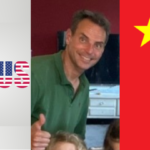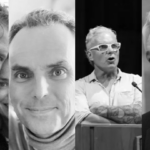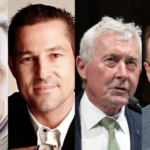Albanese Complicit in United States’ Use of Australian Citizen as Political Pawn

An Australian citizen since 2012, former US marine fighter pilot Daniel Duggan returned to his family home in the NSW town of Orange last October, after ASIO had indicated that he’d been cleared for an ASIC card, which permitted him with the security clearance to work in the local aviation industry.
Since 2017, Duggan had been managing AVIBIZ, an aviation consultancy in China, which had meant he’d been located both in regional NSW, where his Australian wife and six children live, as well as in the coastal city of Qingdao in Shandong Province, where he’d been making his living.
So, it came as a bit of a surprise to Duggan, who’d served 13 years in the US military, which ended in 2002, that when he arrived back in his home country, the director general of our nation’s chief domestic spying agency informed him there had been a mistake and he’d failed security clearance.
And soon after, on 21 October, 54-year-old Duggan was taken into the custody of the Australian Federal Police on behalf of the US, and has since – close to 290 days now – been held in prolonged solitary confinement in maximum security facilities and classed as “extreme high-risk”.
The White House accuses Dan of breaching US arms control law when he trained Chinese pilots in South Africa over a decade ago.
However, according to an international lawyer advising his family, the version of events that casts this as show trial designed to support mounting US-China cold war tensions is the correct one.
A cold war pawn
“This thing reeks of politics,” said Dr Glenn Kolomeitz, principal lawyer and intelligence analyst at Cardinal Legal, who’s been providing advice to the Duggan family. “I’ve been through the US indictment, and it reeks of politics.”
“The indictment uses the word conspiracy 178 times. I believe that’s intentional,” he added. “If you have the word conspiracy written 178 times alongside the word China, and you present it to a grand jury, of course, they’re going to indict, bearing in mind, grand juries in the US are civilians.”
A 2017 Trump administration grand jury indictment lays five charges against Duggan in relation to an alleged conspiracy “to export, or attempt to export, and propose the exportation of defence services to the People’s Republic of China in violation of an arms embargo”.
This alleged criminal behaviour is said to have taken place around 2010, when Duggan was training pilots from around the globe, including China, at the Test Flying Academy of South Africa (TFASA). And eight other conspirators are mentioned, including UK, Chinese and South African nationals.
According to Kolomeitz, the indictment was established at the time when the US, the UK and Australia, all commenced framing their policies and laws around “China as an adversary” and suggesting that Beijing poses a threat to western interests in the Indo Pacific region.
This shift in international relations was the subject of discussion at a Marrickville community meeting in March, which saw former Australian foreign affairs minister Bob Carr outline that he noted the change in our nation’s foreign policy rhetoric towards China at that same time.
“The indictment refers to co-conspirators besides Dan. And that, in itself, is problematic because some of them are British, and the British have said they haven’t done anything wrong,” Kolomeitz told Sydney Criminal Lawyers. “The UK said that none of their people had broken any rules.”
Political in nature
Following Duggan’s October arrest and remanding, attorney general Mark Dreyfus gave the greenlight to the US extradition request on 9 December. This is under the terms of the 1976 Australia-US extradition treaty.
However, there are two reasons why this nation’s chief lawmaker’s decision is problematic.
The first, as Kolomeitz pointed out, is that the treaty law provides that “extradition shall not be granted” if “the offence in respect of which extradition is requested is of a political character”. And if nothing else, the case against Duggan is political in nature.
The other issue with extradition sign-off is that, again, under treaty law, in order for Duggan to be extradited to the US, the criminal conduct he’s been accused of must be a crime in Australia, and as Greens Senator David Shoebridge has repeatedly pointed out, Dreyfus has not confirmed this.
A red herring
The claim that Duggan is being made an example of in an effort to portray to the US and Australian publics that Beijing does pose a threat to both nations, as it’s been conspiring against them, is further supported by it having been common for ex-military officers to provide training abroad.
Indeed, at the same time the AFP took Duggan into custody, the UK announced it was investigating 30 ex-military pilots in relation to training Chinese nationals and warned against doing so going forwards, which prompted our defence minister Richard Marles to say he’d be doing the same.
“It is a regular thing for military people to go and train or work overseas. A lot of Australian pilots have done it – gone and trained people overseas,” Kolomeitz underscored. “It is a common thing for Brits and Americans to do. A lot of British have gone overseas to train people. It is far from unusual.”
“The company TFASA is probably the most reputable test flight training school in the world. They have the best test flight pilots on staff from the US and UK,” the lawyer added regarding Duggan’s South African employment.
“It was an honour to work there amongst these highly regarded western test pilots.”
Potential reprieve
But it appears there could be a light at the end of the tunnel in Dan’s case.
Duggan’s lawyers lodged a complaint with the Inspector General of Intelligence and Security (IGIS) claiming that ASIO lured the father-of-six back to Australia with the promise of a security clearance in order to arrest him on behalf of the US, as such a move is legal in that country, but not over here.
“The IGIS very rarely picks up investigations,” Kolomeitz made clear. “And they’ve never picked up one in these sorts of circumstances. So, the fact that they’re looking at it is quite telling.”
So significant is the inspector’s decision to investigate “the lure” scenario, that Duggan’s criminal defence team unsuccessfully attempted to have a stay placed on proceedings when the case went back before the Downing Centre Local Court early last week.
But proceedings were instead again adjourned until 23 October for a directions hearing, and whilst the IGIS inquiry continues, extradition proceedings are currently scheduled to go before the courts in late November.
Kolomeitz had just come from visiting Dan in Lithgow Correctional Centre on Wednesday when he spoke to SCL. He explained that whilst the man, who has never been charged with a criminal offence in the past, is still being held in solitary confinement, he’s no longer classed as “extreme high-risk”.
“The conditions aren’t ideal,” he outlined. “He’s allowed to have a couple of hours of exercise most days now, out in a triangular yard. So, he has a bit more colour in his face now. He was very gaunt the first time I saw him – very pale, gaunt and unwell.”
“A lot of colour has come back to his face,” the lawyer said of Duggan, who had no idea that an unsealed 2017 US indictment was awaiting his return to Australia last October. “He is still very stressed. The communications with his lawyers and his family’s lawyers are very restricted.”







